Peta: La Femme Nikita's Secret Weapon
[from GEAR, Special Premiere Issue, Sept/Oct 1998]
[The images on this page originally accompanied the article]
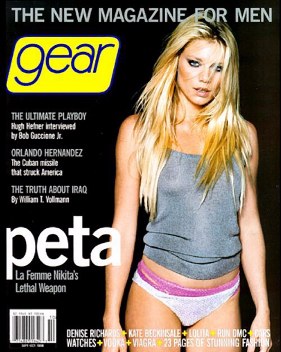
cherchez la femme
On TV Peta Wilson is deadly. In real life, Jonathan Bernstein discovers, she's just dangerous.
"I'm scared shitless. I'm a frightened person." When Peta Wilson, who plays the lead role of the couture-clad, reluctant assassin on the USA Network's sole cult hit La Femme Nikita expresses the preceding sentiments to me on the Toronto set of her show, I don't believe her. It's hard to, given Wilson's towering 5'11" frame and baleful "this is going to hurt me more than it's going to hurt you, but it's still going to hurt you" gaze. Nonetheless, she's quick to emphasize the disparity between her on-screen demeanor and her own personality. "Scary movies scare me," she says in a rapid, raucous throaty Australian honk, a world away from her character's trademark enunciation, which tends to be pitched somewhere between a whisper and a threat. "When people get upset that scares me."
When we meet a week later for dinner in New York, she's reconsidered, loudly declaring: "Those things that make you frightened are what's standing in your way of being happy. Nothing really scares me. I've faced my fears, embraced them and got over them."
Cleansed of all inhibitions, Wilson is one of those rare individuals who takes big bites out of life and laughs with zest and pleasure as the juices cascade down her chin. Effusive, gregarious and endlessly tactile, she will hurl herself bodily -- versatile, snow-white locks flying -- into any potential interpersonal connection, free-associate her way through labyrinthine conversational catacombs (most of which she'll suffix with a shrug of either , "but then, I'm Australian" or "but then, I'm a Scorpio"), and dispense bone-crushing bear hugs and stinging ass-slaps at the slightest provocation.
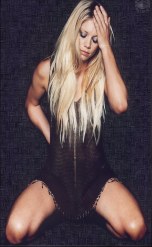 Though it's bracing to get intimately acquainted with such a sexy free spirit, you also have to factor in the inescapable moments when she will: 1. Burst spontaneously into song (Estimated Time of Occurrence 10.54pm); 2. Grab your hand and yank you up on the table, insisting you dance with her, while surrounding patrons look on and applaud (ETO 12.10am); and 3. Demand that you link arms while drinking (ETO 12.47am). None of which is to imply that Peta Wilson is anything less than a powerhouse of a woman, just that her outsize allocation of energy is a daunting proposition to someone accustomed to picking at a strained and pureed version of life. As we exit the restaurant, I flinch away from an affectionate head-lock. "You're frightened of me," she says, accusingly. I deny it, but she looks like she doesn't believe me.
A similar disbelief has festered for years in Hollywood. Audiences won't shell out to see the Action Babe, is the conventional wisdom. They find her intimidating. Unfeminine. Butch. Even in the not-so-distant past, when the Giant Action Smash-Up was the most profitable and acceptable of all genres, and movies featuring guys who couldn't order a meal in English but could execute a spinning kick that would send an arms dealer crashing through a window on the 32nd floor were acclaimed by the undemanding, no one clamored for a female equivalent.
Every attempt to establish an action heroine met with derision and empty seats. Sigourney Weaver in the Alien series and Linda Hamilton in T2 hit the mark but both grew from their roles rather than starring in customized vehicles. The fates of Giant Action efforts tailored for Geena Davis (The Long Kiss Goodnight), Sharon Stone (The Quick and the Dead), Pamela Anderson (Barb Wire), Jamie Lee Curtis (Blue Steel), Lori Petty (Tank Girl), Cindy Crawford (Fair Game) and Bridget Fonda (Point Of No Return, the failed first attempt to Americanize Nikita) tell the real story.
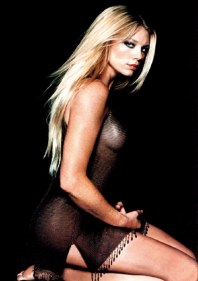 Yet if moviegoers afforded the Action babe a chilly reception, the same has never been true in TV land. In the 60s, Honey West, The Avengers' Emma Peel and Mission: Impossible's Cinnamon Carter held sway. The 70s ushered in Charlie's Angels, Lindsay Wagner's The Bionic Woman and Lynda Carter's Wonder Woman. Though the 80s were devoid of iconic examples, over the past couple of years a trio of series spotlighting complicated women possessed of lethal hands and feet have been embraced by those members of the couchbound public active enough to bestow cult status on a show.
The heroes of Xena, Warrior Princess, Buffy The Vampire Slayer and La Femme Nikita are not only characters fully enough realized to prevent their shows degenerating into the spectacles of humiliation they could well have been, but also embodiments of a new breed of action star. Xena, an avowed standard-bearer for righteousness, is perpetually plagued by her genocidal tendencies. The petulant Buffy deals wearily with her vocation like a piano prodigy forced to practice scales when she'd rather be dating. Then there's Nikita, the covert killing machine who wanders the corridors of Section One, the super-secret upper government department that sprung her from prison in a state of hushed paranoid wonderment like a temp on her first day in a malign corporation.
Wilson says: "In movies, it's very hard for two hours to get that combination of action and drama. On TV, there's action every week but the emotional development of the characters is constantly growing. People get hooked." Wilson is aware both that the small screen has become a sanctuary for the Action Babe and that she and her high-kicking sorority are redefining the stereotype. "I'm not playing Schwarzenegger with a handbag. When you're a woman taking on big bad guys, that's frightening. Nikita's a hired killer but there's always that element of fear that she could die."
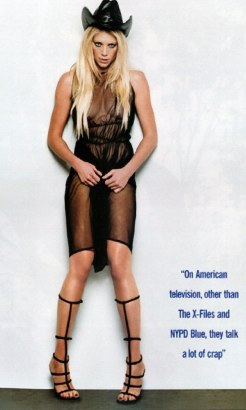 Initially a style-strangled combination of The Prisoner, Mission: Impossible and a vintage Calvin Klein Obsession ad, the TV Nikita has succeeded in making a virtue of its excesses. The pregnant pauses, meaningful glances and deadpan enunciation that once induced chortles gradually became the series' signature. "That was always the style but it took a while for people to get it," says Wilson. "On American television, other than The X-Files and NYPD Blue, they talk a lot of crap. People's concentration levels are so low. They watch TV so much, how do you keep them interested in a show where the style is different and the characters are ambiguous?"
The untamed intensity Wilson brings to the role is a prime attention-grabber. While she doesn't say that no American actress could match her mixture of the visceral and the vulnerable, she dismisses Nikita movie predecessor Bridget Fonda with a curt wave of her hand. She's scarcely more generous to the Livs, Gwyneths and Umas. "They're just so..." She adopts a frail, cowed, timorous posture. "They don't have that..." Words once more failing her, she balls her fists and emits an antagonistic snarl.
American actors don't get off lightly, either. "They're all such pretty boys. Where are all the real men?" Of course, a pretty boy plays an integral part in Nikita's constituency. Endless speculation fills the show's multitude of internet fan pages concerning the snail's pace development of the love that dare not speak its name between Nikita and her mentor/tormentor/fetish Michael (played by Quebecois actor Roy Dupuis), who turns in a performance so inert it's virtually still life. Says Wilson: "He's a man of few words and movements. Consequently, I've got to keep asking myself 'why the hell is she attracted to him?' It's a bit S&M."
The most complicated of potential couplings is defined when Nikita (it's not the sort of show where anyone ever thaws out sufficiently to call her Nikki) escapes from Section One and then decides she wants back in. To help her fake her abduction and return to HQ without arousing undue suspicion, Michael does her the favor of beating her bloody. "We made out love scene like a fight scene and our fight scene like a love scene," says Wilson with relish.
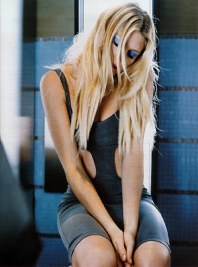 Born in Sydney, Australia in 1971, Peta Gia Wilson and younger brother Rob were uprooted by the demands of their Army officer father Darcey's profession and relocated to New Guinea. Dealing with constant displacement (the family would move another dozen times before she turned 13) bred in her a vivid imagination which sparked an ambition. "When I was nine years old I saw Thunderbolt and Lightfoot and I said, 'I want to be like Jeff Bridges.' That's when I started to dream about being an actress."
She never pursued this yearning in Australia but did achieve a modicum of recognition as the youngest player in the national netball squad. Her stature, carriage and those locks led to a modeling career, dismissed now with a curt, 'it wasn't full-time'. It did, however, last long enough to cause her to become bulimic. In 1978 her weight dropped from 140 to 110 pounds.
After growing out of both modeling and vomiting, Wilson moved to Los Angeles in 1991. Three months later, she met and moved in with writer/director Damian Harris, son of Irish actor Richard Harris. The ego problems that might occur in a relationship between actress and director have failed to lessen the pair's bond. "I really appreciate and respect what he does, as he does me. I think part of the reason we fell in love is the creative abilities that we have. That's attractive."
Wilson spent the next six years studying acting under a protege of theater legend Stella Adler and consuming as much Tennessee Williams as humanly possible. Then she prepared to strike out for New York and look for stage work. "That's when my agent called and said, 'can't you do TV?' I said, 'what the [deleted]? My personality on telly? It won't fit!' Nonetheless, she turned up for the audition for Nikita,snatched a basketball from a casting director's hands, bounced it off the walls, then sat down and charmed the pants off the assembled executives. She was instantly offered the part.
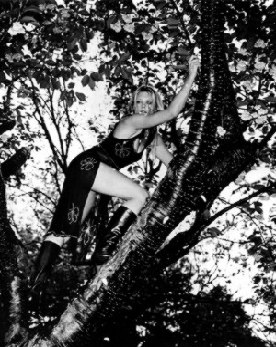 When I started I was like, 'holy Hell, what am I doing?' I come from the theater. But now I've learned the techniques, it's harder to do than some fantastic play. There are so many things you've got to think about, like when the commercial break's coming."
Wilson has a haunted look that sets her apart from most TV actresses. I describe it as Nordic, almost Viking. She sets me straight. "Nordic? I think it's the Scot in me. Scottish girls are fair. I was going to dye my hair dark then I thought, blondes were very strong. Mae West, Bette Davis. Things changed, now there's this stereotype of what a blonde-haired girl is. I don't know how that happened." Marilyn Monroe, I offer. "So you take what Marilyn Monroe had, add this oomph and you've got this other thing. Maybe the Australian in me. I think Australians are the modern-day Vikings."
Though she is tied to Nikita for three more years, movie offers are coming Wilson's way. She talks about developing an action movie she'll be ready to play when she turns 35 (she's 27 now), but is otherwise cautious. "The next choice I make is going to be something that feeds me creatively. I'm already getting exposure so it's not necessary to do a movie for exposure unless I wanted to blast myself into some kind of [deleted] place where I didn't have a life which I don't want to do. I've been offered a bit of money, too, but it's like, well, what do you need? I'm making a nice living." Nice enough to indulge a growing jones for vintage cars ("I've got a 56 T-bird, a 58 Chevrolet Impala convertible and a 38 Dodge"), but apparently not yet anywhere near the level where a distorted view of reality sets in. Back at the Nikita set, she'd said: "At any moment, you know, this wave that I'm riding like a surfboard rider is going to crash and I'd better be ready for the [deleted] tumble-turn that's going to happen. I know at any point it could finish and you'll be like, 'who [deleted] was Peta Wilson?'"
So saying, she left to film the last scene of the final episode of the second season. Her closing sentence: "I'm not afraid."
|
